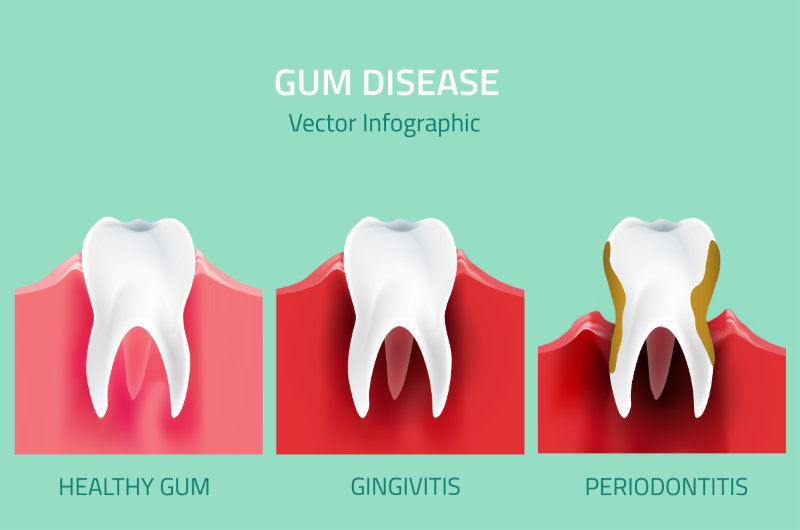An attractive smile is key to overall well-being. Understanding and treating common dental problems are integral to maintaining an attractive, pain-free smile. This comprehensive guide explores some of the most prevalent oral health concerns by outlining symptoms, causes, and potential treatments.
Early Detection and Prevention Are Key: Prevention is key to dental health. Regular brushing with fluoride toothpaste, flossing regularly, and dental checkups are all crucial to maintaining optimal oral hygiene. Early detection can often allow for more rapid intervention with less invasive solutions, saving both pain and cost in the long run.
Common Dental Issues
- Tooth Decay (Cavities): Cavities, one of the world’s most pervasive dental issues, occur when plaque accumulates on teeth and produces acids that wear away at protective tooth enamel, leading to symptoms such as toothache, sensitivity to hot or cold temperatures, visible cracks or dark spots and visible cracks between the teeth. Causes may include poor oral hygiene practices, eating an abundance of sugary food and beverages, and dry mouth conditions; treatments range from fluoride therapies and fillings, and, in some severe cases, crowns may be used to restore tooth structure – prevention is best.
- Gum Disease (Gingivitis and Periodontitis): Gum disease, an incurable infection affecting gums and supporting structures of teeth, progresses over time. Early-stage gingivitis often presents as red, swollen, or bleeding gums, while advanced-stage periodontitis usually appears as receding gums, loose teeth, and chronic bad breath. Gingivitis is caused mainly by plaque buildup, but factors like smoking, hormonal shifts, or medications may also increase your risk. Gingivitis treatments involve professional cleaning services and improved oral hygiene practices. Periodontitis may require a more intensive deep cleaning procedure (scaling and root planing) or, in severe cases, gum surgery. Maintaining excellent oral hygiene habits, regularly scheduled dental cleanings, and managing contributing factors like diabetes are all effective preventive measures against gum disease.
- Bad Breath (Halitosis): Chronic bad breath can be an embarrassing and often telltale symptom of deeper issues. Halitosis symptoms include an unpleasant odor in the mouth. Possible causes can range from poor oral hygiene to dry mouth, tonsillitis, food debris buildup on the tongue, sinus problems, and medications that lead to sinus issues – and even certain medical conditions! For effective treatment to occur, focus on eliminating its source. Brush, floss, and scrape regularly while staying hydrated as necessary, and consult a dentist/ doctor when required.
- Teeth Sensitivity: Sensitivity to hot, cold, sweet, or acidic foods and beverages causes tooth sensitivity – pain that results from sudden sharp stimulation to your tooth enamel – typically felt upon exposure to hot, cold, sweet or acidic stimuli such as food or drinks that change temperature abruptly or trigger specific stimuli like teeth grinding against each other or root exposure during brushing. Possible causes may include worn-down enamel, receding gums, cracked teeth, gum disease or root exposure from aggressive brushing techniques used against root exposure – potential solutions include using fluoride toothpaste specifically tailored towards sensitive teeth or desensitizing agents – crowns or fillings can cover exposed tooth surfaces while also addressing causes (like gum disease). Preventative measures include gentle brushing techniques with soft bristle toothbrushes when eating/drinking acidic or sugary food/beverages to limit consumption.
- Tooth Erosion: Tooth erosion occurs gradually due to acidic agents that go beyond what causes cavities, often manifested through flattening teeth, increased sensitivity, or the dentin (the yellowish layer beneath enamel) becoming visible – all telltale signs of erosion. Too many acidic foods and beverages (such as sodas and citrus fruits), acid reflux, bulimia, or certain medications can all contribute to enamel erosion. Remineralization using fluoride therapy, bonding, or crowns to restore tooth structure and manage its source can be used to address erosion. Limit acidic foods and beverages when possible and drink through a straw; rinse your mouth with water after eating to clean off food debris; actively manage acid reflux issues for prevention purposes, and try not to repeat their mistakes!
- Cracked or Broken Teeth: These injuries may occur through accidents, biting on complex objects, decay, or large fillings weakened from decay or large fillings; pain, sensitivity, and sharp edges in the tooth are typical symptoms. Treatment options depend on the severity of the crack or break and range from fillings, crowns, or root canal therapy (in severe cases, tooth extraction may also be an option) with preventative actions including not using your teeth to open bottles, wearing a mouthguard during contact sports games and addressing teeth grinding issues.
- Oral Thrush: This fungal infection often appears as white patches on the tongue and inner cheeks, with associated burning sensations, difficulty tasting food, and swallowing discomfort. Familiar sources include an impaired immune system, certain medications, dry mouth conditions, or recent antibiotic use; treatment includes antifungal tablets, gels, or oral suspensions prescribed by your dentist as lozenges or gels for lozenges or suspensions, respectively. Preventative steps include maintaining good oral hygiene practices to strengthen immunity and consulting your dentist about medication usage requirements – these actions all help keep thrush at bay!
- Canker Sores: Canker sores are small and painful ulcers on the mouth’s soft tissues. While their exact cause remains unknown, possible triggers include stress, acidic foods, minor mouth injuries, vitamin deficiencies, or hormonal shifts. Although most sores go away independently with time, topical medications can relieve pain while encouraging healing. To manage flare-ups, consider managing stress levels, avoiding triggers, and prioritizing vitamin intake.
- Dry Mouth: Lack of saliva production can make your mouth uncomfortable and increase the risk of tooth decay, making life more uncomfortable overall. Medications, medical conditions, aging, or dehydration can cause dry mouth. Solutions include staying hydrated and using artificial saliva products such as chewing sugar-free gum to stimulate salivation, staying away from tobacco products as much as possible, and seeking treatment for any underlying causes.
- Impacted Wisdom Teeth: Wisdom teeth are typically the last permanent teeth to emerge and may lack sufficient room. If they become impacted or trapped beneath your gums, they can cause painful symptoms like pain, swelling, jaw stiffness, and possible damage to surrounding teeth if left affected for too long. In such instances, impacted wisdom teeth should be extracted by either a dentist or oral surgeon as soon as possible.
How Do Dental Professionals Contribute?
Regular dental visits are vital for detecting and treating common dental ailments. Your dentist or hygienist can provide professional cleanings, identify early warning signs of trouble, and develop tailored treatment plans for your unique oral health needs. Don’t be shy to express any concerns or raise queries – open communication between team members ensures long-term oral wellness!
Conclusion
By understanding and practicing good oral hygiene habits and working with your dentist, you can prevent many dental problems and keep your smile looking its best for years.
Are You Looking for a Dentist in the Shelby Township area?
While regular dental checkups and cleanings can help keep you looking your best, sometimes additional treatment may be required to achieve optimal oral health. HPS Dental can assist in this effort—schedule your appointment by dialing (248) 652-0024. Let us help you reach your potential smile!


